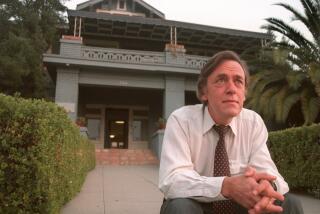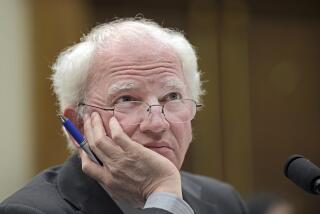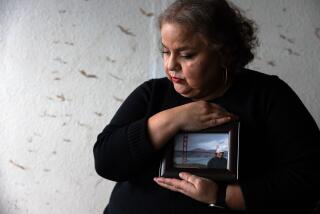Undocumented Chico man passed the bar, but can he practice law?
When Sergio C. Garcia was sworn in as a lawyer at a courthouse in Chico late last year, hundreds showed up. A local restaurant gave out food and a Spanish radio station covered the event.
In this community bounded by orchards and fields, Garcia’s success was unique, and cherished.
His parents had brought him to the United States illegally when he was 17 months old. They toiled as farmworkers and constantly encouraged their children to go to school. As an adult, Garcia worked full time at a grocery store while attending college. He passed the bar exam on the first try and after a two-year wait, he received a notice saying he could be sworn in.
“I kind of broke down and started crying,” he said. “I’d been working at this for 20 years.”
But Garcia’s life as a lawyer lasted only a couple of weeks. He now works alongside his father as a beekeeper while the state Supreme Court determines whether he should be allowed to have a license to practice law. The case could set a precedent for other undocumented students who want to be lawyers.
The State Bar of California certified Garcia after he met rigorous requirements, including passing the bar examination and receiving a positive moral character determination from the Committee of Bar Examiners. Bar officials will file a brief on the case this month.
Because of the pending case, Garcia, 35, won’t discuss why he was allowed to practice for a short period, though he says media inquiries about his immigration status prompted the bar to reexamine the case. State bar officials won’t discuss the case because the process is confidential.
A similar case is pending in Florida, where the state bar asked the state Supreme Court for an advisory opinion on whether Jose Manuel Godinez-Samperio and other undocumented immigrants can be granted licenses to practice law.
John Eastman, a law professor at Chapman University in Orange, said it’s unlikely the court will rule in Garcia’s favor.
“I think existing federal law makes it very problematic for him to get a license to practice law,” he said. It is illegal for anyone to hire Garcia. And federal law makes it illegal to grant him a professional license without state legislation, he said.
Eastman said that although he believes current federal immigration laws are too restrictive, until there’s a change, “I think it’s foolish to do everything you can to ignore the existing immigration laws which make it unlawful for somebody to work here who is not in this country lawfully.”
Holly Cooper, associate director of the immigration law clinic at UC Davis, said the state has a vested interest in allowing law graduates to practice if they pass the bar exam.
“If the decision doesn’t go well, it could be one more ceiling that an undocumented student will hit at some point,” she said.
Garcia was born in the western Mexican state of Michoacán. Before he turned 2 years old, his parents took him to Northern California. They stayed for several years, until he was 9, when they decided to return to Mexico, he said.
His father eventually returned to the U.S. alone to work while the family remained in Mexico. During that time, he was able to secure a green card under the 1986 amnesty law, Garcia said.
In Mexico, Garcia loved going to school and excelled there, earning several recognitions. But watching the Mexican justice system play out left him wanting to be a lawyer.
“When somebody got busted for any reasons in my town back in Mexico and they didn’t have money to bribe the police, they had to stay in jail,” he said. “They didn’t have any rights. They didn’t know how to represent themselves. There was no justice.”
At 17, Garcia returned from Michoacán along with the rest of his family and enrolled in high school. Not long after, his father sponsored him for a green card, an application that has been pending for 18 years.
In his off time, he worked with his father clearing brush and doing other work in the local almond orchards.
“Dad moved pipes around for them to get water,” he recalled. “They’re huge pipes, and when they have water inside they’re so heavy, you end up muddy. The pipes get so hot they’ll burn your hands when you grab them.”
Garcia was able to leave the fields after he was hired at a grocery store. During the 12 years he worked there, he took classes at a community college, then transferred to Cal State Chico.
After finishing college, Garcia took night classes at Cal Northern School of Law. He had imagined he would study criminal law but couldn’t come to grips with the idea of defending someone who might be guilty. He switched to civil litigation and personal injury law.
Adam Sorrells, a personal injury and civil litigation lawyer in Chico, took him on as an intern. He was impressed with Garcia and let him help with everything he was permitted to do as a student, including making a court appearance.
“Here’s a guy that’s done everything right,” Sorrells said. “He has no criminal record, he’s worked all his life; he pays taxes; he treats people with respect and he’s nice to people.... When we look at society, at what we ask of our citizens, everything that Sergio has done with his life is what we expect of a good citizen, somebody who deserves to be a lawyer.”
Garcia is optimistic the court will rule in his favor. He hopes his case could open doors for many others like him.
While he awaits a decision, he’s back helping his father.
Most days they wake up before dawn and head out to the fields where the bees are kept.
“It’s terrible,” he said. “It’s hot out there, and those bees sting like crazy. But I don’t mind.”
More to Read
Start your day right
Sign up for Essential California for news, features and recommendations from the L.A. Times and beyond in your inbox six days a week.
You may occasionally receive promotional content from the Los Angeles Times.







